- Home
- Laura Purcell
Bone China Page 22
Bone China Read online
Page 22
Miss Pinecroft observes us; the whites of her eyes shine. She says nothing. She has watched Creeda bend over me with a sharp metal object, and she has not said a word in my defence.
‘It was you, wasn’t it?’ I rage. ‘You opened my trunk, made me think that poor Merryn—’
‘It’s for your own good!’ Creeda mutters and turns on her heel.
She escapes from the room, her dress billowing like black wings in the darkness. A bat, I think. A witch, a mad woman.
My heart will not stop pounding.
Miss Pinecroft sighs and shifts in her chair. Her focus returns to the china: pale shapes, bone-white in the gloom. The china that Creeda’s family made.
‘What was she doing with the scissors?’ I demand. ‘What did she take?’
Nothing.
‘For the love of God, Miss Pinecroft, I want to help you! Please speak to me!’
Only my own voice echoes back. Miss Pinecroft is spellbound.
The skin about my temples tightens. Spellbound. There is something in that. Creeda’s pagan ways, her people manufacturing the china.
Can a woman control a house, a family, through something as brittle as porcelain?
I turn my head to inspect the plates, now small moons hanging against the wall. My hair brushes against my neck. I push it back. Pause.
Now I know what Creeda took.
She has cut off a lock of my hair.
PART SIX
A Broken Man
Chapter 32
‘A little to the left. Turn the honeypot. No, the other way. There!’ Ernest stepped back to admire the display of china Creeda had assembled. Mellow spring sunlight reached through the window to caress each piece. ‘Capital!’
‘The mode is to put them on a sideboard, sir,’ Creeda said.
That was what his wife had craved too: a sideboard full of fine china. No doubt her taste was superior. But to his mind, such presentation took away from the colours. When natural light could catch it, the white background was luminous and pearl-like. The blues sang: mazarine, Prussian, one the shade of Bristol glass. By God, he wished she could see it.
Did she see it, somehow?
‘There is no sense in limiting myself to a sideboard when I own such large, empty rooms.’
‘Empty rooms in the mermaid house,’ Creeda muttered, turning to the window.
It did not do to let these asides go unchecked. Lunatics, given an inch, would soon convert it into a mile. ‘I beg your pardon, Creeda?’
Creeda did not trouble herself to face him. Her gaze remained fixed out at sea. ‘Sorry, sir. No offence. I was just saying, the man that built this house. He called it after the mermaids.’
‘Morvoren? Is that what it means in the local cant? I was not aware.’ He rubbed at his forehead, feeling the strain there. This practical chore was meant to be a respite for both of them: distracting Creeda from her mania and him from his overtaxing work in the caves.
So far, it had not been a success.
‘They didn’t take too kindly to him using their name, did they?’
‘Come again?’
Creeda stroked the curtain. ‘The mermaids, sir. Didn’t you hear? Both the man’s ships and all their cargo went down at sea. He was near ruined when you bought his house.’
‘Of course I was aware, Creeda,’ he replied wearily. ‘It was a stroke of luck on my part. A mere Bristol physician would not have been able to afford an establishment of this quality, had the owner not been forced to make a hasty sale. Naturally, I pity the man, but this has always been the way of it for merchants. Not a day went past in town when the coffee houses were not ringing with news of some disaster or the other. But you seem to be implying that the wreck was some kind of …’ He stopped for a moment as his brain finally caught up with him. ‘Wait. How did you hear of this story?’
Creeda was not the kind of girl to blush. She merely lowered her chin. ‘People tell me things.’
‘People from your father’s clay mines,’ he finished sternly. ‘How many times must I repeat that you are not to set foot on that property?’
‘I don’t go to the mines!’ she flared. ‘I never would. But the people who earn their living there, they talk to me at market. And they’re not like the decorators at the factory. They know things.’
‘You are not to associate with them. Mr Nancarrow stipulated that his employees were not to catch wind of …’
He ran a hand through his hair. What use was all his work if these miners were filling her head with superstitious hocus-pocus the moment he had emptied it? Perhaps his methods had been too gentle. Though he could not condone the savage practices of the Bedlam doctors, their theory was correct: the mad must be dominated. Forced to submit to the overpowering logic of their physician’s mind. Only in all good conscience, he could not say that he had been the model of logic recently.
Once again he heard the strange, hollow music of the caves. It sounded like that instrument Mr Benjamin Franklin had invented: the glass armonica. Had he not thought, when the jars began to ring, just for the briefest moment, that maybe she … But he was overstimulated. Working too hard. Everything would return to its right course, once he hit upon the cure.
‘Do you hear me, Creeda? No more talking with the miners. I insist.’
Finally, she turned. He could see from the set of her mouth that she was not won over yet. Was that the malady of her mind, or the stubbornness of a girl her age? ‘There has been some good come of it, sir,’ she pleaded. ‘One gave me weed.’
‘Weeds?’ He repeated, perplexed. ‘As in herbs?’
‘No, sir. The discoloured clay no one wants. Weed’s what they call it. I’ve been playing about, throwing it – after my duties are done, of course. Seeing what I can do. You said I should busy my thoughts with practical things.’
‘Yes! That is precisely so!’ In his relief he seized upon it a little too eagerly. ‘This is the only transformation that should concern you: mere clay and water into something exquisite. That is real magic, Creeda. Human endeavour. Have you continued to paint?’
With a shy smile, she crept towards the china display and pointed out an unglazed vase shaped like a pagoda. ‘This here’s one of mine. Father sent it undecorated for me, but it never looks as good when you paint it after the firing.’
He squinted at the design. Not the Chinoiserie pattern he would expect on a piece of this nature – of course, the girl would do nothing predictable. It was a native flower. A familiar one.
‘Digitalis!’ he exclaimed happily. ‘Why, did you copy this from my supplies? I distil it in the alembic. Foxglove.’
‘Fairy bells,’ she corrected.
Hell and damnation, did the child never relent? Why the deuce could Creeda not pick gowns to fuss over like Kitty, or better yet, something useful as Louise had done? To give one’s life over so completely to the fantastical … His irritation was matched only by his fear for her.
‘Creeda,’ he remonstrated, as gently as he could manage. ‘You know this must stop. If I cannot show your father some improvement …’ He opened his hands, as if he could display the madhouse and all its horrors there. Then a thought struck him. ‘Tell me this: if you fear fairies so, why do you seek to keep them in your life? Why paint their flowers, read about them, if it gives you pain? Even supposing they did abduct you, which I am far from allowing … Would it not be better to forget?’
She returned his look in that unnerving manner of hers. The expression of her blue eye was always different from the brown one. Harder. ‘Do you forget, sir?’
For a second, he was speechless.
‘I see them everywhere now,’ she went on, ‘I can’t help it. They opened my eye.’ She laid a finger on her cheek under the cornflower iris. ‘It’s a new way of seeing. Of looking. Like those men you tell me discovered how the blood flows, or how miasma spreads. Please, sir. I know you understand. Don’t you see everything differently since they … went?’
He should have been furious
at such impertinence. He knew it, but did not feel it. She chilled the anger within him.
‘Papa?’
The door squealed on its hinges.
His daughter stood on the threshold. She had entered without knocking as he had done, so many times.
Suddenly, he was conscious of how close he stood to Creeda, and how the china display resembled a strange sort of shrine.
Louise had implored him not to buy any more china. She had said they had no use for it.
‘Louise.’ He drove his hands inside his pockets to hide their fidgeting. He felt like a fool.
How much had she heard?
His daughter’s face betrayed little. It rarely did. Whether she was rolling pills or standing in the hell of a consumptive’s sickroom, her features remained faintly troubled. But there was that crease between her brows. Deeper, these days. Soon it would be there permanently.
Her cool eyes moved behind her spectacles: from him to Creeda, to the china. Assessing. Silently condemning. It was a sickening sensation: to have his own child stand in judgement on him. For a moment he saw her as a woman, fully grown, beyond his recognition.
‘Papa,’ she said firmly. ‘It is time for you to go to the caves.’
Chapter 33
Louise hovered on the beach, a tureen of gruel growing steadily heavier in her arms. Surf licked at the heels of her boots as it rolled onto the sun-warmed sand. Standing here, the hole in the cliff face was nothing but a gaping void. It seemed absurd to imagine that people, living breathing people, would dwell within.
She found herself wanting just one more minute. Another moment in the fresh air, where the waves masked the sound of retching and coughs. It was not like her to fall prey to such weakness. She was flustered, that was all. Hard work would set her right. Heaving up the tureen, she took a deep breath and marched across the sand.
A volley of choking greeted her at the mouth of the cave. No men sat together swapping stories by the fire pit.
Only old Seth limped up to her, bowl in hand. ‘You’re a sight for sore eyes.’ His voice was like gravel. ‘Starvin’, I am.’
Hurriedly, she set the tureen down. ‘Please, help yourself. Where is Dr Pinecroft?’
He shrugged, more interested in the gruel. She noticed the marked way in which he favoured his left leg as he moved. This was a new and alarming development. Could it be that the disorder had spread to his hip?
‘What of the other men? Do they keep to their beds? It sounds as if someone is very unwell.’
Seth ignored her, lifted the lid from the tureen and scooped his bowl in. Tattoos marked his stringy arms, their ink faded and creased. It was as he removed a brimming bowl and began to rummage in his pocket for a spoon that Louise noticed something else winding between the black patterns.
The same red mark she had seen upon Harry, weaving across the skin like crimson thread.
‘Come here—’ she began, but a cry cut her off.
‘They’ve got me! They got me!’
She ran. It was not easy on the damp, stony surface. She tripped and stumbled, splashing through the shallow rock pool, but her urgency was not misplaced. As she drew nearer to Chao’s hut, she heard Papa’s voice.
‘Hold still, man!’
The door stood ajar and both Chao and Michael were lying on their backs while her father knelt between them.
He made no endeavour to conceal the anguish on his face. ‘Louise! Thank God that you are come. Something has happened, something strange, I cannot …’
‘They marked me!’ Chao choked. ‘I saw them come in the night and do it.’
Papa extended a hand to restrain him. It was covered in dried blood.
‘Whatever does he mean?’ she asked.
‘This mark … It is on Michael, too.’ Papa shook his head. His hair had come loose from its ribbon tie and fell chaotically about his face. ‘I changed his silk setons for ones of India rubber, and when it was done I saw … Well, come and see for yourself.’
Releasing Chao, he crawled from the narrow space between the patients to the door of the hut. Louise helped him to stand. With unwashed clothes and his skin streaked with dirt, he might have passed for one of the convicts himself.
‘I have never seen anything like it,’ he confided. ‘In all my years of physic, I never …’ He broke off, coughed.
Her blood turned cold.
‘Sit there, Papa, on that rock there. You are exhausted. I should have been here with you, caring for them.’
He let her push him down, but continued to gesture while he coughed. ‘The mark …’
‘Very well, I will go and look at it.’
She had to hitch her skirts up and fight her way into the cramped hut. The smell was indescribable. Both men appeared to have soiled themselves. Scarlet trickled down the side of Chao’s face.
‘Miss!’ He tried to sit upright. ‘Miss, look what they did to me!’
His shirt was unfastened at the neck. A mass of blotches were spread over the skin. Chao pulled the material up to show his stomach. It was covered in the same wild red scribble as Seth’s arm.
‘Their little feet,’ he gasped, rubies bubbling from his lips. ‘Like blades. They danced on me. Danced.’
The image was appalling. She reached for a cloth and carefully wiped the blood from his mouth.
‘What do you mean, Chao?’
‘I saw them,’ he insisted.
‘Saw what?’
His lips trembled beneath her cloth. ‘The things that live underground.’
Next to her, Michael spluttered painfully. The man was in a terrible state. Papa had exchanged the silk setons under his ribs for bulky rubber ones that tortured the skin. Pus was draining down the tubes unchecked. She did her best to clear it, but it swelled up anew from underneath. At least there were no blotches or scrawls near the wound. Yet Papa said he had seen something …
Awkwardly, she assessed the rest of his visible skin. There. That wobbling line, paler and pinkish, traced on his feet.
‘Things that live under the ground,’ she murmured as the realisation broke.
Papa was wrong to say he had seen nothing like this. He had seen something exactly like it, although less severe.
‘Papa!’ She struggled up and through the narrow door. ‘Papa, I know what it is.’
He was still sitting on the rock, elbows propped on his knees, eyes fixed on the ground.
‘Worms, Papa!’ she cried triumphantly. ‘It is just an infestation of worms.’
He stared at her in astonishment. All at once, something seemed to break, and his mouth fell open.
‘Papa?’
‘Worms. My darling girl. Of course! Worms.’
He began to laugh. There was something terrible in that laugh. Bitter.
No matter how hard she attempted to smile, her cheeks would not obey.
‘Damp, moist conditions,’ she explained quietly. ‘The diarrhoea that accompanies the malady. It is an ideal environment for the hookworm to thrive.’
He had taught her that himself.
She remembered each and every lesson. A younger man, with no grey streaking his hair, sweeping her into his arms and sitting her upon his lap to explain what he was reading. The smell of him, sharp and clean, and the rumble of his voice as she laid her head against his chest.
Papa had survived the consumption, yet somehow she was losing him all the same.
‘What would you recommend?’ She pressed him. ‘Rue and alum? Santonica clysters?’
‘Yes … all of that. We must endeavour to keep everything clean. Bring a jar of burnt alum and some rosemary, would you? I will …’ He waved one hand vacantly, ‘… fumigate.’
‘Yes, Papa.’
He hung his rumpled head.
A broken man. That was what one of the apothecaries back in Bristol had whispered, after it happened. She had never believed them until this moment, would not have dreamed Papa capable of making an error, let alone one so amateur. Every surety in her life s
eemed to be crumbling away.
‘They were right,’ he told the ground. ‘Even gouty old Redfern. They were right, and I was not. How blind I have been. How damnably proud.’
‘I do not understand—’
‘They said this disease was beyond my ability, and they were correct. I am a gentleman’s physician, no pioneer. I should have confined myself to leg ulcers, quinsy and gout.’
‘No. That is untrue. You have not slept—’
‘I doubt I will sleep again. God!’ He slapped his hand against the rock, making her jump. ‘It was to be our purpose, Louise! The one thing to make sense of it all. I was so sure …’ He stared towards the back of the cave. She saw the muscles in his jaw clenching and releasing. ‘We suffered, but I thought we were called … There was a reason …’
He trailed off into silence. The wind whistled through the rocks.
‘Papa,’ she said urgently. ‘What are you staring at? Papa! Look at me!’
He did. And now she wished he would not. Being held by his gaze was like being held in the grip of a fever.
‘Worms, Louise. I failed to detect something as simple as worms.’ He laughed again, a horrible, gasping sound. ‘When I think of your mother … of little Francis. What else might I have missed?’
Chapter 34
Harry was the last to be treated with her rue posset. He had not emerged from his hut the entire morning.
Louise knocked upon the wooden door, nervous about what she might find inside. But Harry opened it straight away, upright and dressed. His eyes gleamed in the low light. Even now they were better acquainted, she could not be certain of the exact colour of his irises. They were changeable, like the ocean: mutable depths of green, blue or grey.
‘Louise.’
‘Miss Pinecroft,’ she corrected, less firmly than usual.
‘Please, come in.’
Why did it feel different to be alone with him? She nursed the other men without a thought, only turning away when Papa was obliged to administer the clysters. But as she negotiated the step inside the hut, she felt self-conscious. Perhaps it was the similarity in their ages.

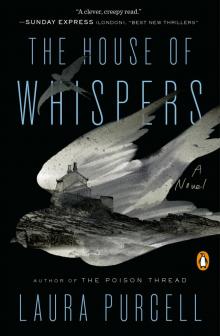 The House of Whispers
The House of Whispers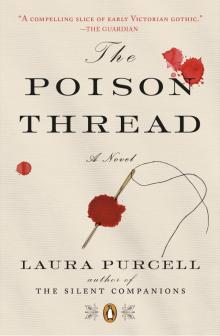 The Poison Thread
The Poison Thread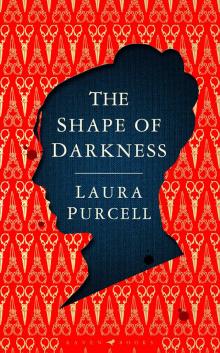 The Shape of Darkness
The Shape of Darkness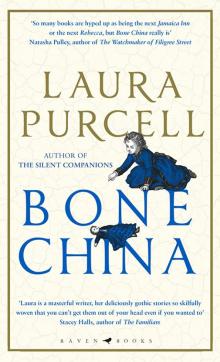 Bone China
Bone China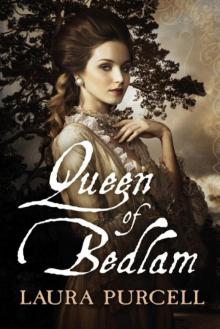 Queen of Bedlam
Queen of Bedlam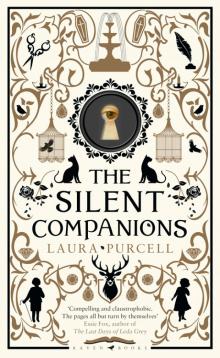 The Silent Companions
The Silent Companions